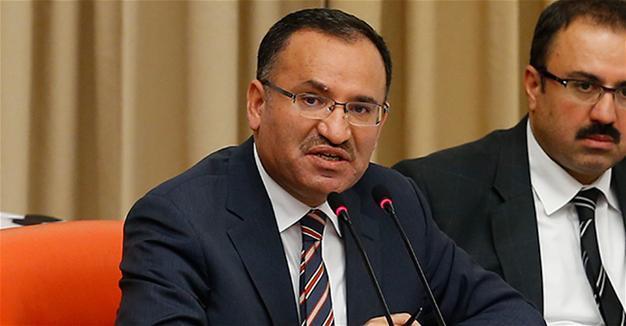Turkish gov’t predicts parliament will approve constitution changes with over 340 votes
ANKARA

AA photo
The ruling Justice and Development (AKP) believes its constitutional amendment package will be approved with the votes of between 340 and 350 lawmakers, Justice Minister Bekir Bozdağ has said, after the first two articles of the amendments received 343 and 347 votes, respectively, late on Jan. 10.
“The result of [the votes on] these two articles indicate that the proposal will be accepted by parliament by around 340-350 votes,” Bozdağ told private broadcaster A Haber on Jan. 11.
His words came after parliament voted in favor of the first two items of 18-article constitutional amendments, which will shift Turkey from its current parliamentary system to an executive presidency. The results showed that the AKP and the Nationalist Movement Party (MHP) voted almost in full in favor of the package and they will have no problem in securing the 330 required votes to take the overall draft to a referendum, Bozdağ said.
Secret vote controversy
On the heated debate on the “secret ballot” that erupted after AKP lawmakers cast their ballots openly during the voting session, in violation of the constitution, Bozdag admitted that the current constitution stipulates “a secret concealment of the vote.”
Health Minister Recep Akdağ was fiercely criticized by opposition lawmakers for not following the secret ballot rules by not entering the cabinet to vote in the first voting session of the General Assembly late on Jan. 8. Akdağ’s angry response prompted a brawl between MPs, with opposition lawmakers accusing Akdağ of violating the bylaw.
“I might have been violating the law. What’s it to you?” Akdağ was caught on video shouting in response.
Bozdağ said the law stipulates a secret vote, but claimed that “getting into the cabinet to vote is not necessarily included in this process.”
“The secret ballot does not mean you must go into the cabinet, close the curtain and vote. It means giving the vote secretly. Because nobody sees the stamp in your hand. What is important here is to give the vote secretly, whether in the cabinet or not,” he said.
CHP criticism
The opposition argued that the AKP was making a special effort to prevent any defections in order to guarantee the 330 votes needed to bring the constitution to a referendum. Lawmakers had previously debated engaging in “open voting” for this purpose, and many have suggested that lawmakers would cast their vote openly in an effort to pressure any AKP or MHP lawmakers who might be considering voting against the package.
In the past, parties used methods such as voting without closing the cabin, collecting vote stamps, and vote-monitoring in order to prevent rebellions in parliament.
“The [main opposition Republican People’s Party] CHP is claiming that the secret ballot rule requires voting in the cabinet. They are using cameras in order to try to document the voting, thus violating another bylaw to prove it. As far as I can see, there were three votes and all three were made by observing the rules of confidentiality,” Bozdağ said.
“If someone feels pressured or threatened and does not want their vote to be known, and if there is a mechanism to prevent them from voting accordingly, then this would be in violation of the constitution,” he added.
Bozdağ also criticized former CHP leader and current Istanbul deputy Deniz Baykal for comparing the constitutional amendment proposal to the Syrian constitution.
“Even [Syrian President Bashar] al-Assad does not have the authorities [granted by this new constitution proposal],” Baykal had said on Jan. 9 in parliament during discussions on the charter, adding that the amendment will transform Turkey to a “party state”
Baykal ‘exaggerates’ in his criticism
Justice Minister Bozdağ slammed Baykal’s criticisms as “exaggerated,” saying the establishment of a party state is “strictly out of the question.”
“This is their exaggerated interpretation … To try to establish a relationship with the Constitution of al-Assad and present it as a copy is a huge defamation and distortion,” he said.
Bozdağ also criticized CHP leader Kemal Kılıçdaroğlu for his earlier comments on the ongoing state of emergency announced shortly after the July 2016 failed coup attempt.
“The government staged a civil coup [with the state of emergency],” Kılıçdaroğlu said on Jan. 9 in a CHP group meeting, adding that the government was exploiting the extensive authorities granted by the state of emergency rule.
Bozdağ said Kılıçdaroğlu’s argument was the same as the argument used by the Fethullahist Terrorist Organization (FETÖ), which is said to be behind the coup attempt.
“Unfortunately the CHP is the subcontractor [of FETÖ] inside parliament,” he added.
